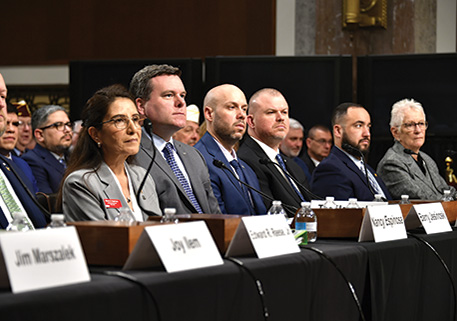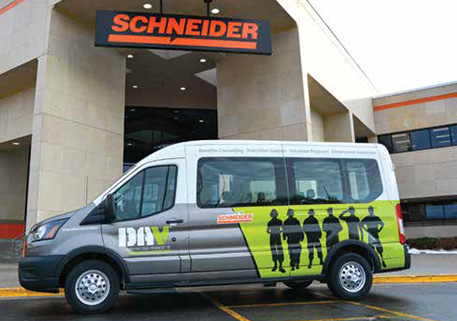VSO coalition members release veterans programs budget recommendations to Congress and the Administration
In February, DAV—along with Paralyzed Veterans of America (PVA) and Veterans of Foreign Wars (VFW)—released The Independent Budget (IB) for fiscal years 2017 and 2018, outlining funding requirements for the programs, services and benefits administered by the Department of Veterans Affairs (VA).
IB partners have developed and presented independent budget projections for veterans’ programs to Congress and the president for the last 30 years to inform both lawmakers and the Administration about the needs of their members and all veterans, and to offer substantive solutions to address the many health care, transition and benefits challenges they face.
“Our budget recommendations cover all discretionary programs for fiscal year 2017 as well as advance appropriations recommendations for medical care accounts for fiscal year 2018, reflecting our best estimates of the actual cost to provide veterans with the benefits and services they have earned and are entitled to receive,” said DAV Washington Headquarters Executive Director Garry Augustine.
“The IB report outlines what it will take to properly staff the health care system and to ensure that there is sufficient capacity and resources so that all injured and ill veterans who want to use VA have that option,” he added.
This year’s IB proposes a total of $84.4 billion in discretionary budget authority for the VA in fiscal year 2017. The Administration’s fiscal year 2017 discretionary budget request for the VA is $78.5 billion. However, the VA also anticipates spending an additional $5.7 billion for community medical care from funds previously appropriated by the 2014 CHOICE Act, bringing total VA spending on medical care and other discretionary programs in fiscal year 2017 to $84.2 billion.
For fiscal year 2018 advance appropriations, the Administration requested $70 billion for total medical care funding, which includes $3.6 billion in third-party collections, an amount that is significantly below the IB recommendation of $77 billion. The VA indicated that this advance request is provisional, pending resolution of its proposed plan to consolidate non-VA community care programs with the expiring Choice Program, at which time the VA anticipates developing and submitting a revised budget request for FY 2018.
The IB recommended $2.25 billion for major and minor construction, whereas the Administration proposed investing only $900 million to maintain and modernize the VA’s critical hospitals, clinics and other facilities. Without significant funding increases next year and in the future to maintain infrastructure, the VA will find itself ill-equipped to handle the demand for care at many substandard and aging facilities.
The Administration’s budget request for VA Medical and Prosthetic Research rose from $631 million this year to $663 million for fiscal year 2017. However, the IB recommended that an additional $75 million be provided for the Million Veteran Program, a long-term research program creating a DNA repository to better understand veterans’ health needs.
The budget recommendations also include significant increases in fiscal year 2017 for the Veterans Benefits Administration (VBA), primarily to provide additional staffing to process claims for disability compensation and for the Vocational Rehabilitation and Employment Service, as well as a staffing increase for the Board of Veterans’ Appeals (BVA). For VBA, the IB’s FY 2017 budget recommendation was a total of just over $3 billion, an increase of approximately $350 million over fiscal year 2016 approved funding, and $136 million more than the Administration requested. For BVA, the IB supports the Administration’s request for an additional $46 million, which would be a 42-percent increase for next year to help address the rising backlog of pending appeals.
“Both the VBA and the BVA have significant resource needs in order to properly adjudicate claimed benefits and services for veterans, and the Administration’s budget proposal is a good start toward strengthening the processing capacities in both of these two crucial areas,” said Augustine.
The IB organizations have already presented these comprehensive budget recommendations to the House and Senate Committees on Veterans Affairs, as well as the Military Construction and Veterans’ Affairs Appropriations Subcommittees in each body, and will continue advocating for sufficient, timely and predictable funding for the VA.
“It is ultimately up to Congress and the Administration to make the right fiscal decisions to take care of America’s veterans,” said National Adjutant Marc Burgess. “It is our duty, as a collaborative VSO voice, to ensure lawmakers are given the true facts and figures necessary to make that happen.”
Learn More
Online To review The Independent Budget Veterans Agenda and The Independent Budget report, visit independentbudget.org.






